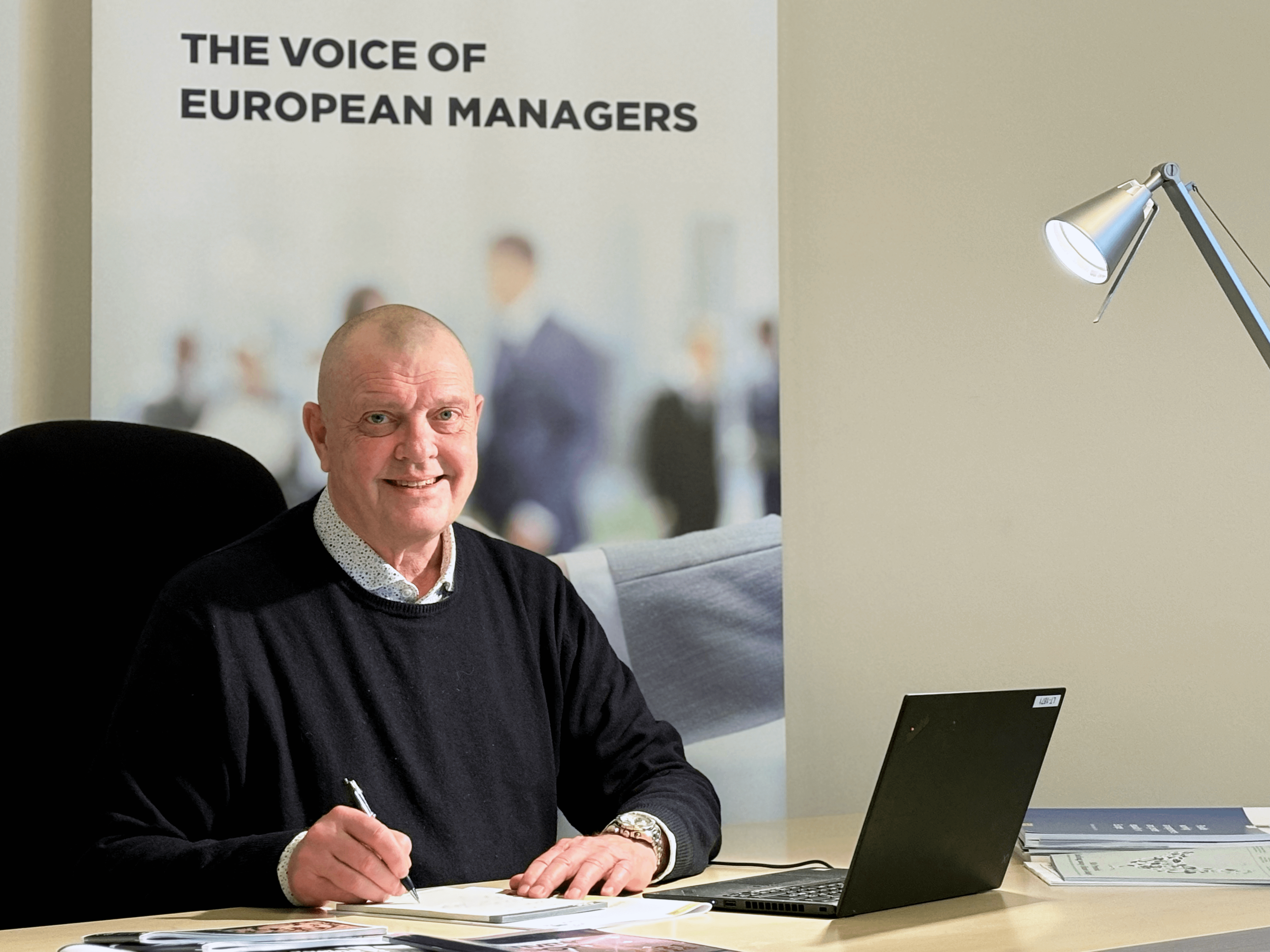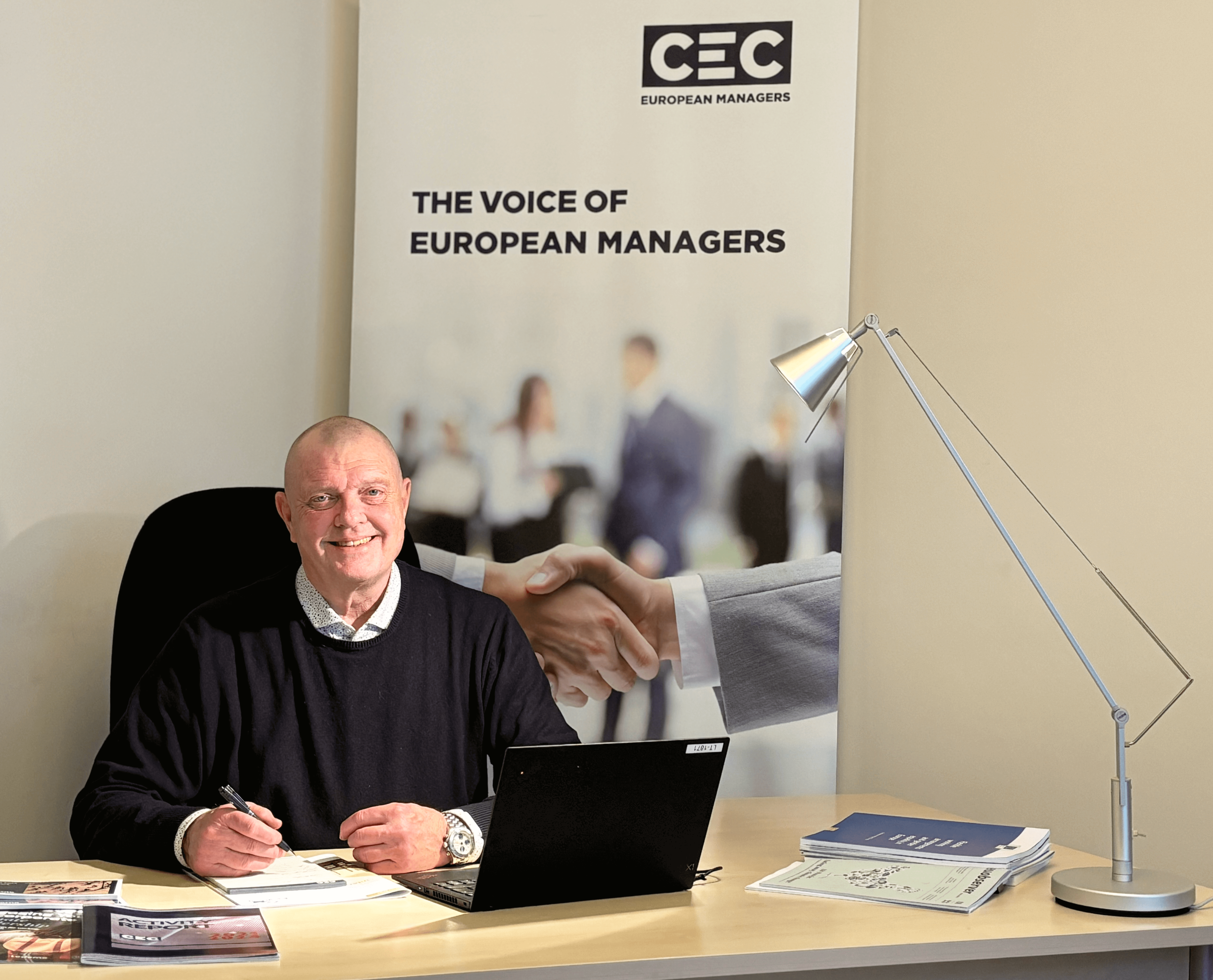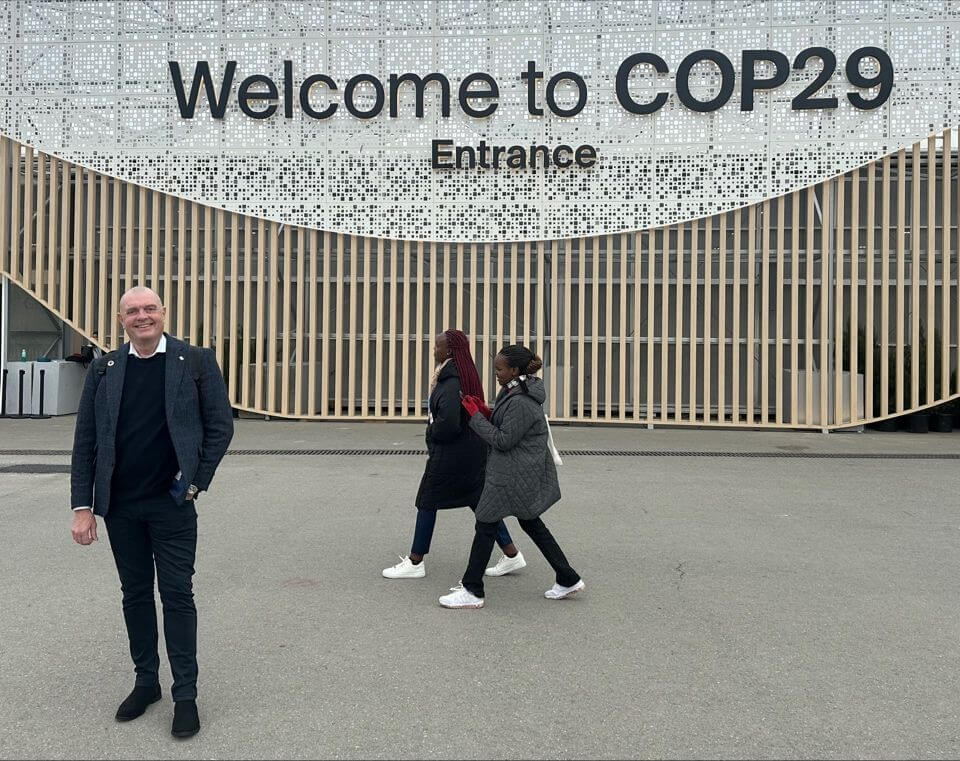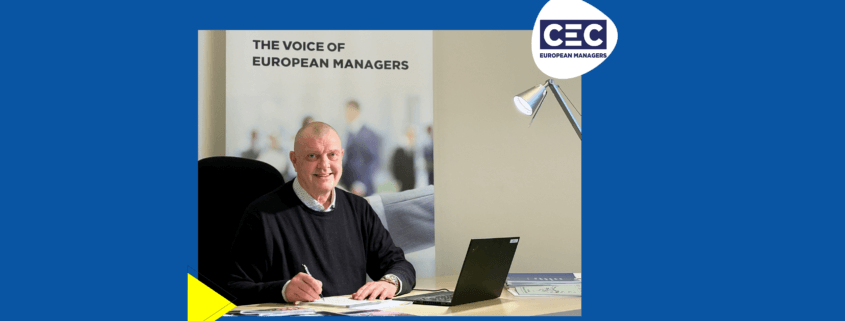“The EU Agenda needs true leaders; come work with us”
Shortly after coming back from COP29, we are chatting with Torkild Justesen, CEC European Managers’ Secretary General, to discuss leadership challenges in the European Union and the importance of joining organisations like CEC European Managers.

Torkild Justesen, Secretary General CEC European Managers
During the interview, Justesen reflected on the definitions of leadership and the importance of the managerial role and shared an invitation to come and work with us.
Good morning, Torkild; how would you introduce yourself?
Management and leadership have always been my passion. I’m a European leader and I’m proud to have been elected twice as Secretary General of CEC European Managers.
I’m also an executive officer at the Danish Association of Managers and Executives – Lederne.
Is there a particular emotional moment in which you released you wanted to become a leader?
I have always felt obliged to make a difference, and there have been many essential moments.
Being in the lead means taking risks, being willing to try your best, and feeling confident that you can make a difference. This has driven me all my life; fortunately, I have had people share this feeling.
What is taking risks in management?
Leading and managing means you are constantly obliged to make decisions that impact your company, work, employees, and stakeholders.
If you’re seeking popularity, if you’re seeking to be hailed as a hero every time you make a decision, then you’re taking no risks, and therefore, you are not leading.
Being in the lead means taking risks.
Leadership it’s also about self-confidence…
Indeed, you have to trust yourself and share your vision and direction. There is a very personal risk because you may be wrong, but this is what it takes to be a leader.
Being humble is also an essential virtue of good leadership. “I may not have the right answers, but I have an excellent idea of where I want to go.”
Can you share an example of a decision that took a lot of work for you in your career?
I’ve been a manager for over 30 years and have been in leadership almost all my adult life. The most challenging decisions are always those that significantly impact people, people you know, and people around you.
You should always consider these kind of decisions very carefully. Fortunately, this only happens sometimes, but it’s okay to lose some sleep over it; be aware of that and not be afraid.
Once you have decided and realized this is what the situation calls for, you will know the best way to execute it.
What does leadership mean for the Danish organisation Lederne?
Leadership is a trait. It is not something that drizzles down from heaven. You can work on it, get better at it, and educate yourself about it.
Sometimes, the best thing a leader can do is look over your shoulder and ask, “Is anyone following you?” If no one is there, then you’re doing something wrong.
The most challenging decisions are always those that significantly impact people around you.
But if they’re still with you, you know you’re on the right track. The foundation of leadership is the changing environment, which calls for observance and education.
Why is it important for Denmark to have an organisation such as Lederne?
An organisation such as Lenderne, and CEC European Managers, for that matter, has the remarkable effect of giving managers a clear voice, reminding decision-makers, politicians, companies, and employees that leadership has a great impact on all of us.
Without leadership, the goals that we set won’t be reached.
We often hear that being a leader means being alone…
This is because managers are often in a very lonesome position. After all, the responsibility is yours.
That is why you need an organisation such as CEC European Managers and its Danish member association of Managers and Executives.
We give voice to millions of European managers and thousands of Danish leaders and managers, and we can connect them.
Leaders and managers are often in a very lonesome position.
Our collective efforts often remind me that you should not ask what your organisation can do for you but what you can do for your organisation.

Nowadays, people have a straightforward and fast question: what can you do for me…
Let’s turn our thoughts back to the good old days and ask what we can do for others. In our case, what can I bring to my society of managers? You can be part of a unity of managers, and this will help you reflect on your situation and make your voice heard on a larger scale.
What is your message to candidate organisations that want to join us?
To have a voice in the European Union‘s agenda, you must be part of a bigger group and have someone to hold the microphone. We can offer to give your managers, whatever country you are from, a voice in Europe.
Come work with us, think about what you can do and what we can do for you, and we will help you.
Together, we can create awareness of the managerial role and the importance of leadership, engage with the European Commission and the rest of the institutions in consultations, and eventually impact the legislative process.
To have a voice in the European Union‘s agenda, you must be part of a bigger group.
What does it mean “managers are the bridge builders”?
It means we transform and adapt decisions into a language that our teams understand, and we consider the best possible choices for our companies.
We understand our company’s needs and ensure its competitiveness. We know exactly what will work and what will not work.
If you want to know if something is feasible, the fastest and easiest way is to ask the managers: Will this work?
Of course, then you have the entire decision-making process. As a decision-maker myself, I know the importance of always considering the big picture before deciding.
How does CEC European Managers “build bridges”?
CEC European Managers is the only organisation solely and exclusively responsible for speaking directly on behalf of European managers.
There are about 10M managers in Europe. We represent 1 million and speak on behalf of all European managers and leaders. We have no other agenda.
If you want to know if something is feasible, the fastest and easiest way is to ask the managers.
We make the stakeholders around us understand the importance of being in a dialogue with the managers because our decisions have a tremendous impact on society.
We make them understand that we can create a better world together. True leaders don’t create all the success stories; they depend on others, they need to enter into partnerships, and they need to listen to everyone.
What is the most significant quality of a leader?
Listening is one of the greatest leadership virtues. Former EU Commission Vicepresident Margrethe Vestaguer has often inspired me. She says that the ability to listen is among the most relevant things in a leadership position.
Many people say, “I listen to you,” but this is not often true. Usually, you have your idea, and you only politely listen. However, if you listen carefully, you might learn something.
You chair our Working Group on Climate Leadership and Sustainability, and you have recently represented CEC European Managers at COP29. What is Climate Leadership to you?
Climate leadership is becoming a worldwide concept. We should all be very aware that leadership is part of the solution to creating a better world and solving the climate crisis.
Leaders should be represented where climate goals and actions are discussed at the United Nations Climate Conference. We will be responsible for implementing governments’ decisions, and we can assess experts.
If you listen carefully, you might learn something.
Climate Leadership is about asking yourself, what kind of leader do you want to be? Do you see yourself as part of the solution?

We live in a global world with multiple crises happening simultaneously. One crisis is ending, and one is beginning. So, crisis management is also part of leadership’s future, which means knowing how to act in a constantly changing environment.
What is a good way to adapt to change?
A good way is to prepare, create new partnerships, trust, and share information on a larger scale.
Involving others is key to creating new ways of thinking.
Regarding managers, CEC represents a broad spectrum of roles in different sectors (energy, banking, chemical industry, etc.). Which sectors will play a more significant role in the climate change transition?
It is wrong to point at individual sectors. It implies that if specific sectors do the job, then the rest of us can relax.
We know that leaders in energy are primarily challenged by needed and very difficult decisions, that the European chemical industry needs help, or that the pharmaceutical industry cannot do without plastics.
All managers, whoever they are, wherever they are, and in whatever sector they are working in, have a tremendous impact on the climate and on being part of the solution to creating a better world. We are all part of the solution.
It is wrong to point at individual sectors when addressing sustainabilty. All managers have a tremendous impact on climate and on being part of the solution
Is this something younger managers must learn?
You don’t have to teach that. Younger people are growing up in a world of constant change.
Younger people know that every action taken today will impact themselves and their children. They know that, especially for every action that is not taken.
We see them all over Europe and the world frustratingly throwing paint in Museums, protesting or gluing themselves to the asphalt in the middle of the Tour de France.
We need to avoid polarization, and older generations have a huge responsibility. We must act wisely and be considerate, engaging the youth in decision-making.
Creating a better understanding of the decision and engaging younger people in the process is the most important thing we could do in the coming years.

What are the next steps for the European Union in that regard?
In the EU, we must focus on creating a competitive Europe and developing innovations through inclusion.
CEC European Managers recently finished the European Project BEYUNBI—Beyond Unconscious Bias. This project has trained leaders and managers to control their unconscious biases and foster equality and competitiveness.
Why has CEC European Managers coordinated such a European project?
There are many reasons, but one is that we cannot afford exclusion in Europe. Fewer babies are being born, and we face a general shortage of skills. The European social model needs more people in the labour market to be sustainable.
Inclusiveness is necessary not only to tackle the smaller labour force in the labour market, but also because, by being inclusive, we create a more extensive understanding.
Our next project will hopefully be on Artificial Intelligence. As managers, we have an obligation to figure out how best to use AI.
Finally, concerning the ongoing legislation and negotiations in Brussels, what is your Christmas wish?
The best Christmas present the EU institutions could give me is an Agenda for 2025 on which the parliamentarians and commissioners discussed the need to engage with managers on all decisions and subjects.
The initial debate took place in 1992, but it is a true Christmas wish to see it renewed. Europe needs good leaders, and together, we shall create a better world.




